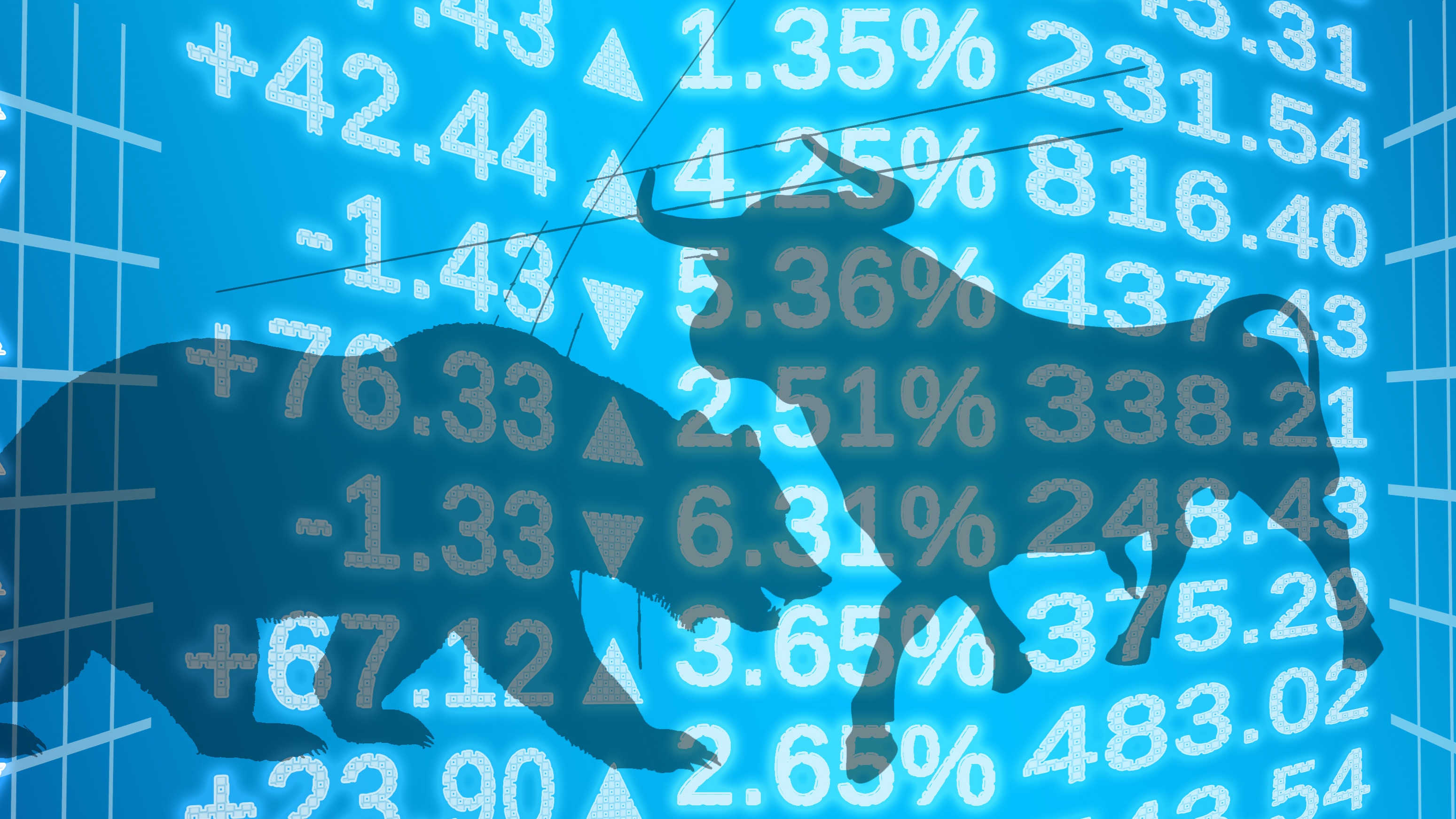Shane Oliver: How to play a faltering bull market
Nothing says we are in a bull market like investing in growth stocks and indexes. But with the ASX Small Ordinaries and NASDAQ 100 down 7.32% and 15.31%, it looks like the post-March 2020 fever dream for markets is officially over. Preparing for what the future holds is imperative as we enter a market with rampant inflation, emerging conflict and ongoing concern about COVID-19.
With the Reserve Bank of Australia set to lift interest rates for the first time in over a decade, many investors are facing an unfamiliar outlook for markets. Accordingly, in order to understand what the global economy will look like and the key actions investors need to consider, I spoke with Shane Oliver, head of investment strategy and chief economist at AMP Capital.
You could argue that the index returns we've had for the last 20-30 years has been very much underpinned by low inflation, sensible economic policymaking and globalisation. The environment investors have enjoyed has actually been a very favourable one. This has significantly benefited index investing and growth stocks... We may have entered an environment where that becomes a little bit more difficult. The love affair that investors have had with growth and tech stocks, as well as ETFs might start to fade a little bit if we come into a constrained environment.
In this wire, Shane shares his outlook for Australia and the world, then discusses what investors need to know as we enter unfamiliar market conditions. Key topics include:
- The macroeconomic environment both domestically and abroad
- The data points his team are paying close attention to
- What the environment will mean for different asset classes
- How investors should be thinking about asset allocation
- Crucial lessons from history
- What investors must know when investing for the long term.

In the first part of this collection, we asked Alexandre Ventelon from Morgan Stanley Wealth Management for his views on where to invest in 2023 and beyond:

What are the main topics for investors going into 2023 and beyond?
Some of the topics we are talking about now will probably continue: I have no doubt that inflation will remain an issue for some time to come. It may wax and wane a bit - we've seen a big surge lately, because of the supply constraints. The constraints will eventually come under control which may see inflation decline, but we've probably also entered an era of higher inflation than we were used to prior to the pandemic. I suspect that higher inflation will be with us for some time. This will mean higher interest rates.
On the war in Ukraine, hopefully, there will be a resolution soon and it comes to an end before we get to 2023. More broadly, we do seem to have entered a more difficult period in terms of geopolitics. This has become apparent in the last few years - the election of Trump in the US, the Brexit vote, increasing tensions between the West and China, and the West and Russia. These tensions have been brewing for a while. I suspect that geopolitics is probably going to be an issue for a while to come, because of the clear divergence in world view between the West and various other parts of the world. We're also seeing a decline in the relative geopolitical power of the US, with other countries trying to take advantage of that. This is going to be an issue for some time to come. There'll also be an ongoing debate about interest rates going into 2023.
But the main issue may be to what degree global growth will slow down as a result of higher rates flowing from higher inflation in the war in Ukraine. Slower growth, or maybe even fear of recession, may become a bigger concern in 2023 than it has been in 2022.
Will this have any impacts on the Australian macroeconomic environment?
Australia is affected by all of those things. We are seeing a pick-up in inflation. We've been affected by the global supply constraints. We are moving towards higher interest rates locally and that will possibly continue into 2023. We're also affected by geopolitical issues, so all of those topics are relevant for Australia.
The specific way those things show up in Australia may be slightly different though. We're not as close to the war in Ukraine compared to Europe obviously. We also inevitably benefit, to some degree, from the geopolitical tensions because we're a commodity producer.
Russian commodities are subject to sanctions, and we are able to fill some of those gaps. This makes it a little bit easier for Australia given a boost to national income, which other countries don't get the benefit of.
Commodity price increases will be across the board. Looking at energy, we produce coal and gas and are a net energy exporter. So we're going to be getting higher prices for our coal and gas. Obviously, we will also pay higher prices for oil, which means higher petrol prices at the pump. That's the downside, but we're also seeing higher prices for grains, particularly wheat, which is great news for Australian farmers. We're getting higher prices for many metals, because of Russia's role in supplying those metals. Nickel is an obvious one. Even iron ore is higher than it was before.
There is a potential risk for Australia that emerges though. So far, Australia is benefiting from this commodity boom. If the geopolitical tensions spill over to encompass China to a greater degree, it could potentially result in sanctions on them. This could actually cause harm to the Australian economy if Chinese growth is harmed as a result of such sanctions. That's a risk in all of this that we need to watch out for as we go into 2023, or even over the next six to 12 months. If China gets involved in a way that causes sanctions to be placed on them, that would adversely affect the Australian economy.
In monitoring the status of the economy, are there any particular data points that you are paying close attention to?
There are several. In terms of supply constraints impacting inflation, the things to watch are business surveys. Most business surveys these days ask questions about delivery lags or supplier delivery lags, purchase costs, how much more companies are paying to buy inputs, and the selling prices.
Accordingly, the business surveys started to see a sharp rise in those inflation blended components well before it showed up in CPI. So if those business surveys start to show a decline in supply deliveries, purchase costs and selling prices, then that would actually be a very good sign going forward.
The other points to watch include semiconductor delivery lags and prices, as well as energy and gas prices in Europe. The world oil price is probably a big one to watch as well. Those are the main factors we are keeping an eye on.
Which asset classes do you think will perform in this environment, or some that investors should be a bit wary of?
Firstly, gold should benefit from higher inflation and geopolitical concerns. It's pulled back a little bit over the last few weeks, but generally speaking, the gold trend has been upwards as these concerns have started to come to the fore. This presents a potential hedge against the problems we're facing. Given the geopolitical and inflationary environment, commodities should do reasonably well through this period.
Normally when faced with a period of uncertainty, you'd want to be in government bonds. But as inflation continues to rise, the bond yield will be under upwards pressure. So it's a bit messy for government bonds at this point in the cycle.
Inflation-linked bonds offer greater protection. Floating rate notes would as well because the rate will go up with the inflation outlook.
Conventional bonds suffer from the problem that as inflation goes up, inflation expectations will adjust upwards, and that will reduce the value of the bonds. That's why a higher bond yield is required. Conventional bonds are probably too risky unless you believe a recession is imminent. In that scenario, inflation would be dragged down, but there's probably a way to go before we get to that point. In the meantime, I suspect that inflation expectations are still too are low, and they'll be revised up, which means high bond yields. If you’re looking at bonds, you either focus on inflation-linked or floating rate bonds but avoid government bonds.
Corporate debt would offer some more protection than conventional bonds because companies have the ability to raise their prices. But we have lately seen they’re having to pay higher spreads over conventional bonds and that's actually been working against corporate bonds. So it's a bit messy for corporate debt, as well.
Looking at stocks, those that have strong pricing power stand out. Not necessarily the consumer sector, but some areas of consumer stocks where there's pricing power, for example, strong demand for cars. Carmakers probably have really strong pricing power.
Some of the industrials are well placed to put their prices up as well too. Defensive stocks are a key beneficiary based on the environment we've come into. But those are the main ones. As a general rule, shares do offer some protection against periods of higher inflation, higher interest rates.
There is a risk that the rise of interest rates will be faster than the rise in company profits, such that share market valuations, at some point, start to come under pressure. That's why there's a case to look at specific sectors in the market, which offer greater protection against higher inflation, in the hope that it would offset any backup in bond yields and interest rates.
Does that mean it is becoming more important to take a more active approach to investment allocation, as opposed to holding an index?
It could; there is certainly an element of that.
When you're in a bull market, you're often better off being in the index. Now that we've come into a more messy environment, there is a case to consider focusing on sectors that provide a bit of a hedge and protection if the inflation problems continue.
They would be some of the sectors I referred to earlier. There is definitely a case to do so.
Obviously, prioritising sectors instead of focusing on the index can lead to higher risk, but by the same token, you could argue that the index returns we've had for the last 20-30 years has been very much underpinned by low inflation, sensible economic policymaking and globalisation. The environment investors have enjoyed has actually been a very favourable one. This has significantly benefited index investing and growth stocks.
We may have entered an environment where that becomes a little bit more difficult. The love affair that investors have had with growth and tech stocks, as well as ETFs might start to fade a little bit if we come into a constrained environment. Returns may not be zero, but you might find that typical indexes deliver somewhat lower returns than they have been.
So that's the main argument there. We've had a tailwind behind some assets that may not be as strong, going forward as we end up in a more constrained environment.
Do you have any lessons that you think investors should keep in mind, especially when it comes to making these long term investment decisions in a period that's full of short term uncertainty?
I think the main lesson for investors is that these periods come along every so often. We obviously saw a rough period in 2020 with the pandemic, but periods of history tell us that eventually, there will always be periods of volatility and weakness in share markets, and they give way to longer periods of improvement. But trying to time the improvement is going to be hard.
A key lesson of 2020 was that after the massive bear market - shares falling 35% or so - trying to time the rebound was incredibly hard. I think most investors probably need to use the opportunities provided by the dips.
This dip could well go further than the one we're in at the moment because there's still more uncertainty about Ukraine, how high inflation will reach, and accordingly how high monetary policy will go.
We could have more downside, and it's probably too early to pile in just yet, but thinking about using the opportunity provided by any further significant falls to average into the market and position for an eventual recovery.
That's the way I would see it. So the lesson really is to not get thrown too far off by the investments. Remain calm, work for the opportunities, the volatility and weaknesses provided, and by the same token, turn down the noise. There's a lot of conflicting information around at present, causing confusion for investors.
That's why you've seen these huge whip arounds in share markets - markets plunging one week, and then surging the next. The unfortunate thing is that might continue for a while yet, simply because of the changing environment that we've come into. So the trick is to find a way to manage that, stick to a long term strategy that works, and turn down the noise.
Are there any comparable periods in history that may offer insights into what we are currently experiencing?
There is a long history of events that have adversely affected markets. The pattern there is quite clear. You get a sharp fall on the back of those events, and that could last anywhere between a few days to a few months.
Whether it's the start of world wars or terrorist attacks, it's a fairly similar pattern that you see unfold in markets.
There are also specific parallels to the 1970s. That period was characterised by high inflation and geopolitical shocks. The Arab oil embargo in '73 was a geopolitical shock, and the disruption from Iranian oil production in 1979 was the same. And they both came at a time of intense geopolitical issues, and they contributed to high inflation. So the 1970s do offer some insights, and that period was seen as one where there are big swings in markets, but against a far more constrained returns backdrop.
To trade markets in the short term, you had to be more nimble. You couldn't just buy and hold in the short term. We pulled out of that period eventually. An index investor ultimately would have done well - not that there were many index funds back then.
That said, there are a lot of differences between now and the 1970s. Arguably, inflation expectations are more firmly anchored, and we have inflation targeting still in place.
Household debt levels, particularly in Australia, are a lot higher than they were in the 1970s, which means that it should be easier to get inflation back under control this time around compared to back then. But nevertheless, it could still drag on for a little bit longer than many investors appear to be accounting for. That is the key uncertainty in all of this. It may take a while longer to get inflation back under control than we've been used to, through the period that prevailed up until the pandemic.
We also need to bear in mind that the shift from high inflation to low inflation has been reflected in asset valuations. 10-year bond yields in Australia in the early '80s were around 15%. Now, they're around 2.5%.
Markets are pricing in a world of very low inflation and minimal access constraints going forward. If inflation is going to be higher, then the fact that we've got low bond yields and higher asset valuations on growth assets, is going to act as a barrier for future returns. Again, these are the tailwinds of the past.
We've benefited immensely from the shift from high inflation to low inflation, which then got factored into investment market valuations. That may reverse to some degree, but it means that we may have become accustomed to double-digit returns, we must concede that going forward they're going to be more constrained.
So the past decade's 14% p.a. index return won't sustain for the next decade?
Well, we'll get them in some years. But when you look back at the average, you'll say, "Oh, that's been a lot more constrained." If you have a rough year, you'll then have a recovery the next year, and it'll give you a great return, but it would be dangerous to extrapolate that. The average is probably going to be a much lower base of returns than what we've become used to.


Never miss an insight
Enjoy this wire? Hit the ‘like’ button to let us know. Stay up to date with my content by hitting the ‘follow’ button below and you’ll be notified every time I post a wire.
Not already a Livewire member? Sign up today to get free access to investment ideas and strategies from Australia’s leading investors.
4 topics
2 contributors mentioned

